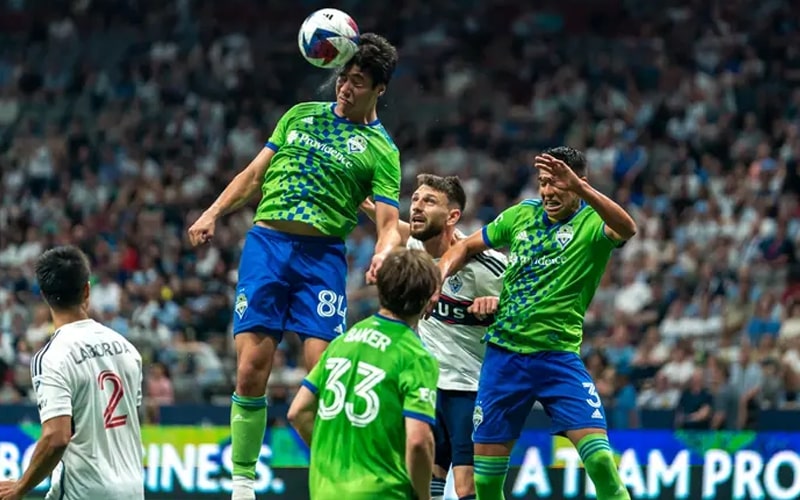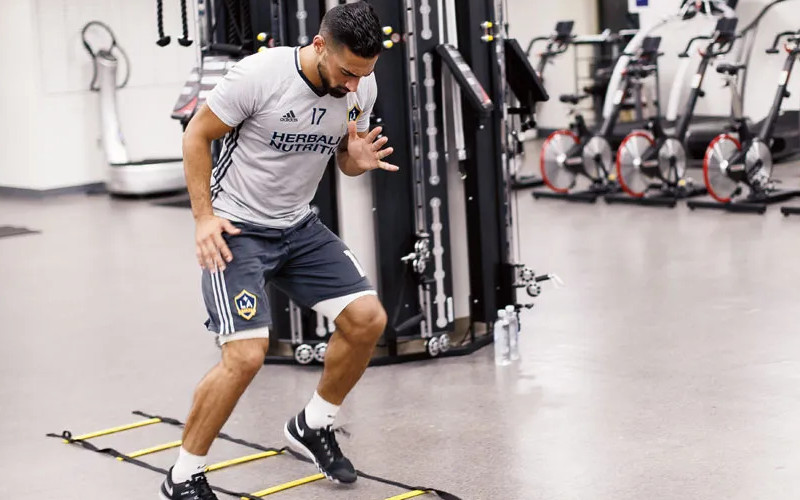A team’s success in Major League Soccer relies heavily on its coach’s expertise and guidance. A good coach can turn a mediocre team into a championship contender, while a poor one can send even the most talented squad spiraling down the table.
As MLS has grown in popularity and stature over the years, so have coaching salaries. In this article, we will explore the factors that shape coaches’ salaries in MLS, profile the top earners in the league, compare MLS coaching pay scales to other soccer leagues around the world, examine how coaching salaries impact team performance, and anticipate future trends in coaching payrolls.
But first, let’s look at how coaching salaries have evolved alongside MLS itself.
When the league was first established in 1996, coaches were paid modest sums compared to their counterparts in other American sports leagues. However, as MLS has grown both in size and reputation, so has an investment in quality coaches. As a result, today’s top-tier coaches command much higher salaries than their predecessors.
This upward trend reflects the increasing demand for skilled soccer managers and the growing recognition of MLS as a legitimate player on both domestic and global stages.
Factors Shaping MLS Coaches’ Salaries
Several vital factors shape the salaries of coaches in Major League Soccer. Understanding these factors is essential for comprehending the salary structure in the league and why certain coaches are paid more than others.
The Role of Coaching Experience in Salary Negotiations
Coaching experience is one of the most crucial factors in determining a coach’s salary in MLS. Coaches with a long history of success at high levels typically command higher salaries than those with less experience.
MLS teams often seek out coaches with a proven track record of success, both domestically and internationally. Experienced coaches are a great asset to any sports team. They bring in their vast knowledge and experience, which can help the team achieve on-field success and ultimately lead to increased revenue. A great example of this is when Atlanta United FC hired Gerardo “Tata” Martino as their first-ever head coach. The team was willing to pay top dollar for his services because of his impressive track record in coaching. Martino had previously managed the Argentine and Paraguayan national teams, FC Barcelona, and other top European clubs.
His experience helped him quickly establish Atlanta United as one of the top teams in MLS, culminating in winning the MLS Cup championship in 2018 before departing for Mexico’s national team job.
The Influence of a Coach’s Winning History
In addition to coaching experience, a coach’s winning history plays a significant role in salary negotiations. Coaches who have won championships or achieved other notable accomplishments are more likely to earn higher salaries than those without such accolades.
MLS clubs want coaches who can lead their teams to victory, and hiring successful coaches can help boost team performance, fan engagement, and revenue streams.
For instance, when Bruce Arena was hired by New England Revolution midway through the 2019 season after winning multiple MLS Cups with LA Galaxy earlier this decade, he was widely viewed as one of the best options for turning around a struggling club that hadn’t made playoffs since 2015.
Arena immediately reshaped the Revs roster while implementing his trademark tactical style; he led them from last place into playoff contention within months – ultimately falling short but earning rave reviews for his efforts along the way.
The Impact of Market Size and Team Budget
Market size and team budget are two critical factors affecting MLS coaching salaries. Clubs based in larger markets have more financial resources available for player acquisition and investment in the coaching staff.
Teams with larger budgets may be willing to pay higher salaries to attract top-tier coaching talent, while smaller-market clubs may need to be more strategic with their spending.
For instance: LAFC is based out of Los Angeles – one of America’s largest media markets – which has enabled them to spend heavily on both players (e.g., Carlos Vela) and head coach Bob Bradley ($1 million+ annually).
On the other hand: smaller-market teams like Sporting Kansas City or Columbus Crew SC may need to be more conservative with their spending on coaching staff due to lower revenues compared with bigger cities like Los Angeles or New York City, where soccer is booming among young people.
The Allure of International Prestige for MLS Clubs
Finally, international prestige is another factor that influences coaching salaries in MLS. Many MLS clubs aspire to compete globally and establish themselves as top-tier soccer organizations.
To do so, they must attract talented coaches with experience competing at high levels abroad. Offering competitive salaries can entice these sought-after candidates to join an MLS club and help elevate its profile domestically and internationally.
For example, NYCFC signed former Arsenal star Patrick Vieira as its first-ever head coach back in 2016; Vieira has reportedly lured away from his role at Manchester City FC partly due to NYCFC’s willingness to offer him an attractive contract package worth $2-3 million per year over three seasons plus bonuses tied into winning titles & reaching playoffs each year which proved successful during his tenure leading NYCFC before moving onto OGC Nice back home France.
Highest-Paid MLS Coaches
MLS coaches’ salaries have increased significantly over the years, and some of the top earners in the league are now making millions of dollars per year. So let’s look closer at the four highest-paid coaches in MLS.
1. Bob Bradley (Toronto FC)

Bob Bradley is one of American soccer’s most experienced and successful coaches. He led the US Men’s National Team to the knockout stages of the 2010 World Cup and coached professional clubs abroad, including Swansea City in England’s Premier League. Since joining LAFC in 2018, Bradley has helped guide them to two consecutive playoff appearances and a Supporters’ Shield win in 2019. He was earning $2.5 million per year in LAFC, so it’s hard to imagine he settled for much less than that.
2. Bruce Arena (New England Revolution)

Bruce Arena is a highly experienced coach who has achieved great success throughout his career. He won three MLS Cups with DC United during the league’s early years before moving on to coach the US Men’s National Team from 1998-2006. After stints coaching professional clubs domestically and abroad, he returned to MLS in 2019 as head coach and sporting director of the New England Revolution. He’s allegedly earning $2 million per year.
3. Phil Neville (Inter Miami CF)

The inaugural season of Inter Miami CF in MLS was a letdown, with only 24 points earned in 23 matches played and finishing at the bottom of the Eastern Conference.
Despite signing top-tier players like Gonzalo Higuían and Blaise Matuidi, they failed to meet their objectives. Their humiliation culminated when they lost to Nashville SC during the play-in round, preventing them from making it into the MLS Cup Playoffs. Consequently, head coach Diego Alonso had to step down while David Beckham, club founder and president opted for a new manager he could trust.
Phil Neville accepted an offer as head coach after being approached by his former Manchester United teammate Beckham. At 43 years old, Neville has held various coaching positions including Valencia CF’s second coach position; England U21 national team; MUFC among others. In addition to this impressive resume is his relationship with other legends of Manchester United which led them all buying Salford FC back in 2014.
Neville has now reunited with Beckham eight years after retiring from professional football as Inter Miami’s new head coach.
He was offered a million dollars per season.
4. Peter Vermes (Sporting Kansas City)

Peter Vermes has been with Sporting Kansas City (formerly known as the Kansas City Wizards) for over a decade, first as a player. He was later transitioning into coaching roles within the organization before ultimately becoming head coach in 2009. During his tenure, he has guided Sporting KC to four major trophies, including an MLS Cup title in 2013 and a US Open Cup title in four separate seasons (2012, 2015, 2017, and 2020). His current salary is reported to be $750,000 per year.
It’s worth noting that while these four coaches are currently among the highest-paid in MLS, many other talented managers working throughout North America are making less money but still achieving great results with their teams.
Overall, it’s clear that investing in quality coaching talent can pay off big time for MLS clubs looking to compete at the highest levels of domestic and international soccer competitions. However, the connection between high salaries for coaches and on-field success must be addressed if teams want to remain competitive within this rapidly growing league.
MLS vs. The World: How Coaching Salaries Compare Globally
MLS is still a relatively young and developing league compared to its more established counterparts in Europe and South America. However, as we’ve seen, the gap between MLS and the rest of the world is closing as the league grows and matures.
Let’s take a closer look at how coaching salaries in MLS compare to those in other soccer leagues worldwide.
A Look at Coaching Salaries in European Powerhouses
Soccer fans all over the world recognize European leagues such as England’s Premier League, Spain’s La Liga, and Italy’s Serie A as some of the most profitable professional sports leagues. It comes as no shock that coaching positions in these leagues are compensated with higher salaries than those in MLS.
To give you an idea, Roma’s coach Jose Mourinho is said to earn approximately $15 million every year. On the other hand, Diego Simeone, the head coach of Atletico Madrid reportedly brings home a whopping $40 million annually. These numbers far surpass even the highest-paid coaches in MLS.
However, it’s worth noting that these top-tier European clubs have much larger budgets than most MLS teams. Additionally, many European clubs have long-standing traditions of investing heavily in their coaching staff as part of their overall strategy for success.
Comparing MLS with Other Emerging Soccer Leagues
MLS may still need to be on par with Europe’s elite leagues regarding coaching salaries, but how does it stack up against other emerging soccer markets?
For example, soccer is increasing in terms of fan interest and investment in countries like China and India. However, coaches in these markets earn significantly less than their counterparts in MLS.
The Chinese Super League – one of Asia’s fastest-growing soccer leagues – has seen a recent influx of high-profile players but has yet to be able to attract top-notch coaches at similar salary levels. The same goes for India’s Indian Super League (ISL), which has struggled to retain quality managers despite offering competitive wages by local standards.
The Reasons Behind Differences In Coaching Pay Scales
So why do coaching salaries vary so widely across different soccer markets?
One key factor is market size – larger domestic audiences translate into more revenue for teams, which can then be reinvested into player and staff compensation. Another important consideration is team budget: wealthier clubs have more resources to spend on top talent across all positions.
However, there are also cultural differences at play. For example, in some regions where soccer is less established or popular than other sports (like basketball or American football), coaching roles may carry less prestige or financial reward than elsewhere.
Overall though, it seems clear that MLS is continuing its upward trajectory when it comes to investing in quality coaches. This trend bodes well for the league’s future competitiveness on both domestic and international stages.
How Coaching Salaries Shape MLS Performance
The appeal of MLS to top coaching talent has never been higher, and much of this is due to the league’s increasing willingness to invest in quality coaches. But how exactly do high coaching salaries impact team performance and the league?
The Appeal of MLS to Top Coaching Talent
MLS is now seen as a stepping stone or fallback option for coaches whose careers have hit a snag. Instead, it has become an attractive destination for ambitious managers who want to challenge themselves in a dynamic and rapidly growing league.
As coaching salaries have risen, so too has competition for these positions. This increased competition means that clubs must offer competitive salaries and benefits packages to attract the best candidates.
Why Investing in Coaching Staff is Crucial for the Success of Sports Clubs
The importance of investing in quality coaching staff cannot be overstated. A coach’s ability to motivate players, devise effective game plans, and make intelligent tactical decisions can often mean the difference between success and failure on the field.
Moreover, having experienced and respected coaches on staff can help attract top players looking for a supportive and professional environment to develop their skills.
The Link Between Increased Salaries and Improved League Reputation
As mentioned earlier, MLS’s growing reputation as a legitimate player on domestic and global stages is closely tied to its investment in quality coaches.
When well-known coaches from around the world come to MLS, they bring with them not only their expertise but also their reputations. This helps raise the league profile among fans, media outlets, and other soccer organizations worldwide.
Furthermore, when MLS teams perform well against the international competition – such as in the CONCACAF Champions League – it helps further cement the league’s reputation as a serious player on the global stage.
Coaching Salaries in MLS
Over the past few years, the league has been actively seeking renowned coaches such as Tata Martino and Frank de Boer by presenting them with enticing contracts. It is anticipated that there will be a stronger focus on data analytics and sports science, leading to an increase in compensation for coaches who possess knowledge in these domains. As teams endeavor to gain a competitive advantage, skilled coaches adept at utilizing sophisticated statistical analysis or pioneering training methods will become increasingly sought-after. Additionally, another aspect that may influence coaching salaries is the ongoing expansion of soccer within North America.
The potential impact of salary growth on MLS as a whole
While rising coaching salaries may seem like a negative development from the perspective of team owners or league officials concerned about financial sustainability, there are also potential benefits.
Higher salaries may help attract more top-level coaches from around the world, improving the overall quality of play in the league. Additionally, by investing in quality coaching staff, teams can help create a culture of excellence that permeates their organizations.
Clever strategies for MLS clubs to secure and retain top-notch coaches
Despite the potential benefits of paying high salaries to top-tier coaches, only some teams may be able (or willing) to shell out millions of dollars each year. So how can smaller-market teams compete?
One possible strategy is to identify promising young coaches who have yet to establish themselves at the highest levels of professional soccer but have shown promise in lower leagues or international competitions. Then, by offering these up-and-comers a chance at a higher profile job with better resources and pay than they might otherwise receive elsewhere, MLS clubs can build winning cultures without breaking the bank.
Another approach is for teams to invest heavily in their academy systems and youth programs to develop their own homegrown coaching talent over time. This requires patience and a long-term outlook but could pay dividends down the road both in terms of on-field success and cost savings.
The Role of Coaching Salaries in MLS Progress
In conclusion, the role of coaching salaries in MLS progress cannot be overstated. As we have seen, investing in quality coaches can significantly impact a team’s success both on and off the field.
Recapping some of the key insights from this article, we see that factors such as coaching experience, winning history, market size and budget, and international prestige all play a role in shaping MLS coaches’ salaries. The top earners in the league are profiled with a focus on their journey to MLS, coaching philosophies and notable achievements, salary figures, and contract terms.
Compared to other soccer leagues around the world, it is clear that MLS still has some catching up to do regarding coaching salaries. However, there are signs that the gap is narrowing as more clubs recognize the value of investing in quality coaches.
The ripple effect of coaching salaries extends beyond individual teams and impacts the league as a whole. By attracting top coaching talent worldwide and improving its reputation for producing quality soccer, MLS can continue to grow and expand its influence globally.
Looking ahead, coaching payrolls will likely continue to rise as MLS strives for greater parity with other soccer leagues worldwide. This presents challenges for smaller-market teams who may need help to compete with larger-budget clubs for top-tier coaches.
However, there are also opportunities for clever strategies that allow clubs to secure and retain quality coaches without breaking the bank. These include offering performance-based incentives or investing in training programs that help develop promising young coaches within their ranks.
Ultimately, this all boils down to recognizing that coaching salaries are not just another line item on a team’s budget – they are an investment in the future success of both individual teams and MLS as a whole. By prioritizing quality coaching talent and paying them what they’re worth, MLS can continue its upward trajectory toward becoming one of the world’s most respected soccer leagues.




